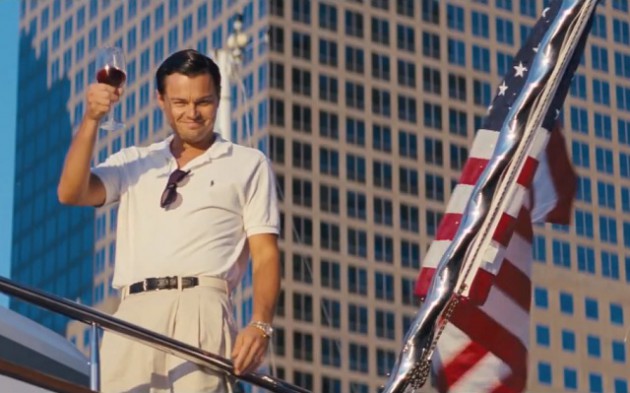
The Wolf of Wall Street (2013) / Drama-Comedy
MPAA Rated: R for sequences of strong sexual content, graphic nudity, drug use and language throughout, and for some violence
Running Time: 180 min.Cast:Leonardo DiCaprio, Jonah Hill, Margot Robbie, Kyle Chandler, P.J. Byrne, Kenneth Choi, Rob Reiner, Ethan Suplee, Brian Sacca, Henry Zebrowski, Jon Bernthal, Jean Dujardin, Cristin Miloti, Christine Ebersol, Jon Favreau, Matthew McConaughey, Bo Dietl
Small role: Edward Herrmann (voice), Jordan Belfort, Justin Long
Director: Martin Scorsese
Screenplay: James V. Hart, Michael Goldenberg
Review published December 27, 2013
 Martin
Scorsese (Shutter Island,
Shine A Light) directs the Terence
Winter (Get Rich or Die Tryin',
"Boardwalk Empire") adaptation of the best-selling memoir from
multimillionaire stock broker Jordan Belfort, turning it into the
closest thing to a comedy the veteran director has made since
After Hours in 1985, though I do think that
GoodFellas, the movie this feels
closest to in narrative structure, has more laughs as a drama.
Some might also be reminded of the De Palma flick,
Scarface, which told a similar
three-hour story of someone pushing product to the public regardless
of its detriment to society as a whole, as we see a barrage of scenes
in which the rewards f the criminal lifestyle is seen as glamorous and fun, only for an
eventual hangover to result in the third act. Also like
Scarface, there is also a cynicism in knowing that the main
character of the story will be regarded as an anti-hero to more
impressionable viewers, who will see Belfort's methods as a blueprint
to success, rather than a cautionary tale of greed run amok.
Martin
Scorsese (Shutter Island,
Shine A Light) directs the Terence
Winter (Get Rich or Die Tryin',
"Boardwalk Empire") adaptation of the best-selling memoir from
multimillionaire stock broker Jordan Belfort, turning it into the
closest thing to a comedy the veteran director has made since
After Hours in 1985, though I do think that
GoodFellas, the movie this feels
closest to in narrative structure, has more laughs as a drama.
Some might also be reminded of the De Palma flick,
Scarface, which told a similar
three-hour story of someone pushing product to the public regardless
of its detriment to society as a whole, as we see a barrage of scenes
in which the rewards f the criminal lifestyle is seen as glamorous and fun, only for an
eventual hangover to result in the third act. Also like
Scarface, there is also a cynicism in knowing that the main
character of the story will be regarded as an anti-hero to more
impressionable viewers, who will see Belfort's methods as a blueprint
to success, rather than a cautionary tale of greed run amok.